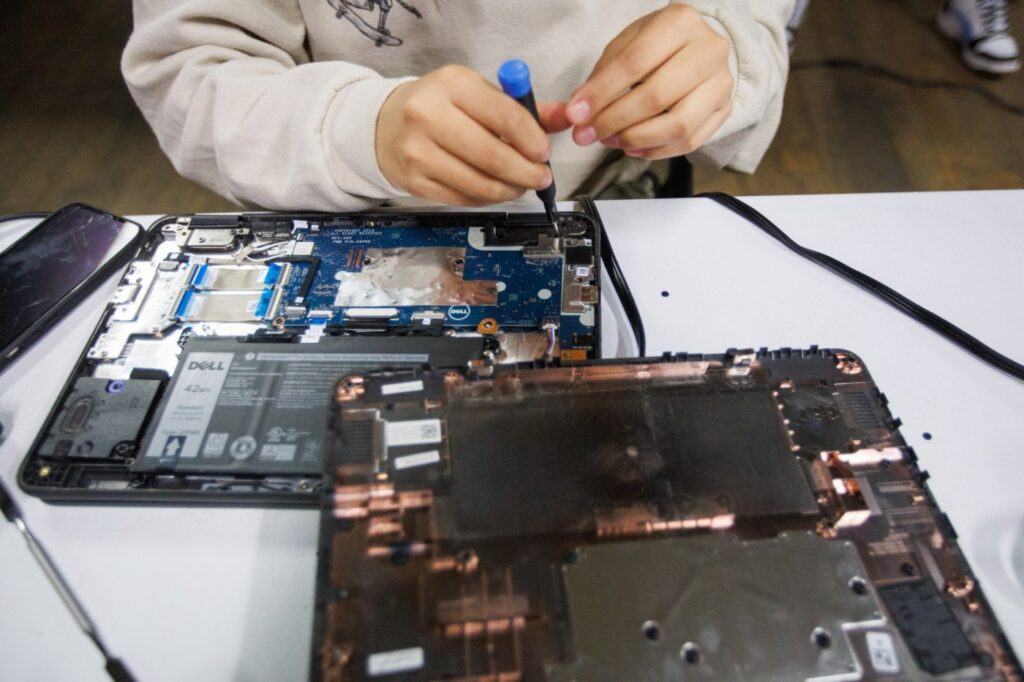
Google is finally extending the lifespan of older Chromebooks — the low-cost laptops used by school districts across the country — after years of limited software support sent thousands of those devices to the trash after just a few years of service.
The policy change comes after the Bay Area News Group in July detailed the struggles with expiring Chromebooks across the region, and how year after year, school districts were forced to recycle the devices due to premature software death dates.
With expiration dates baked into each model, older versions of these inexpensive computers were set to lapse three to six years after their release. Despite having fully functioning hardware, an expired Chromebook would no longer receive the software updates needed to operate, blocking basic websites and applications from use.
But starting next year, Google will begin providing 10 years of automatic software updates for all Chromebooks released in 2021 and beyond. For older laptop models, users will have the option to extend their updates for up to a decade after the model’s original release date — meaning no existing device would expire for at least two years.
Without the extension, 51 Chromebook models would have been headed for the e-waste bin next year, rendering them useless for thousands of students nationwide.
At Oakland Unified, that meant the district was preparing for the expiration of 40,000 Chromebooks over the next five years alone — a loss that would have required the tech department to weed out old devices and purchase new ones, even if the hardware on the former was working properly.
“Schools are telling us that now, they’ll be able to use their fleets of computers longer — and that obviously saves schools money,” said Lucas Gutterman, a director at the US Public Interest Research Group (US PIRG), a national advocacy organization that first raised the issue earlier this year. “Having laptops last longer means budgets will be stretched further, and money can be spent on other things.”
Doubling the life of Chromebooks sold across California in 2020 could save schools $225 million, according to US PIRG — and $1.8 billion nationwide.
At the height of the COVID-19 pandemic, when students were learning online, school districts bought Chromebooks in droves. They hoped that the inexpensive laptops could connect students to their classes without breaking the bank — and by the end of 2020, CALPIRG, the California arm of the organization, reported that global Chromebook sales were nearly 300% higher than a year earlier. At 39%, Chromebooks are the most widely used devices in kindergarten through 12th grade education globally, according to market analytics firm Futuresource Consulting.
But some school districts were forced to replace thousands of those laptops every summer — including Oakland Unified. By mid-July, the school district had already recycled 451 expired Chromebooks, on top of nearly 3,851 in 2022.
At the same time, the district has repaired thousands of damaged — but unexpired — computers, with 1,700 laptops repaired halfway through this summer alone. In a recent analysis, CALPIRG found that Chromebooks are harder to repair than other laptops, mostly due to a lack of spare, affordable and compatible parts.
“Currently, schools need to purchase parts from third parties or scavenge from broken machines. This scarcity can contribute to the high price for parts, making repair uneconomical,” stated CALPIRG in a recent report.
Beginning next year, Google said it will make Chromebooks easier to fix. The tech giant says that soon, Chromebooks will allow school technicians and third-party repairmen to fix software issues without a physical USB key, a change which will reduce repair time by 50%.
Google has extended the software lives of Chromebook models in the past. Those manufactured in 2020 or later, for example, are guaranteed to last until eight years after their model’s release date. But that lifespan wasn’t extended to all devices — and earlier models were still on a time clock.
Now, every Chromebook will be guaranteed to work for a decade — making the laptops’ software commitments longer-lasting than any other operating system available today, according to Google.
“With a lifespan of 10 years, fewer working laptops will be disposed of because they’ve reached their ‘death date,’” said Gutterman. “Longer-lasting Chromebooks are a meaningful step towards an industry with products designed to last.”
